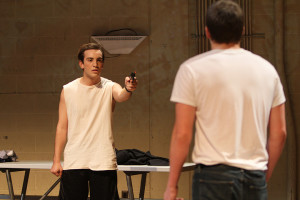
April is a busy month for graduating seniors of the Theatre Department.
This year 12 seniors have each been working with no budget to produce a one-act play completely from the ground up. After selecting a script, students must design and create costumes, stage lighting and sound for the play in addition to directing.
“You take everything that you’ve learned in the four years or two that you’ve been here and you’re basically compiling it into one project,” Morgan Burkey, theatre senior, said. “While you’re here you learn acting, you learn tech. You learn the ins and outs of pretty much every department because you have to be a part of every department at one point so that’s why you direct a play.”
Burkey is directing Starfishes by David Ross Albert, a play about a 25-year-old male virgin who lives with his mother in a lighthouse and his visit with a prostitute.
“They basically teach each other how sex affects their lives,” Burkey said. “A sexual stalemate basically ensues.”
While the plays are only up for a weekend each, the months-long process begins once a play is selected. Students must then design a concept for their shows and present them to the theater instructors.
“You actually are graded on your concept statement,” Burkey said. “Once you pick your play you have to describe why you chose your play, why it’s suitable for an audience, if it’s going to make us money.”
According to theatre students, it’s one of the most comprehensive capstone projects because of all the steps required to produce the play, and each step is graded in turn.
“It’s very similar to junior recital to music performance, just the presentation and then the rejection or picking it apart,” Katie Hamilton, theatre senior, said. “It’s one of the hardest exit finals because it’s hands-on. You’re not testing your memory on paper.”
Hamilton’s play is Traces of Memory by Ann Wuehler, a tale of two women who meet at an abandoned bus stop and bond over their starkly different reactions to tragedies recently caused by the men in their lives.
“One was recently cheated on and she walked in on it,” Hamilton said, “the other killed her family because she was tired of having no say in her life.”
Hamilton said the senior directors must create a collage to visually represent the plays. This too is evaluated by the instructors.
“One of my pictures, and it was painted by a man which I think is real suiting, is a woman’s statue that’s broken in the desert, and that went with my lighting and my core meaning,” Hamilton said, explaining how the image fits her show. “It was a woman broken by a man.”
Normally the directors are provided with a budget, but due to the high number of graduating seniors, the department couldn’t provide much monetary aid to the students, providing a unique hurdle they must leap before walking the stage in May.
Burkey said she and other directors are graded on the same rubric as previous, department-funded one-acts despite the lack of a budget, making it much more difficult to paint the sets or simply find a new couch.
“The show last weekend, Makenzie’s, is set in the ‘60s and she was originally using one couch, and they were like, ‘that couch is too ‘80s, people aren’t going to think that that’s ‘60s so you need to change your couch.’ It’s just something as simple as a couch or a lighting fixture,” Burkey said. “You just have to find it. You just have to make it work.”
Hamilton said she and other students had to turn to their friends and family to get the items they needed.
“Facebook is golden,” Hamilton said as she described her frantic search for a bus stop. “It was just getting too close to show and no one was responding. I emailed Public Transportation of Wichita Falls and I did put it on Craigslist, and I’d drive around looking for things that were loose. I have a truck and I thought that would work out.”
Hamilton said she fortunately didn’t have to rely on destructing public property and instead opted to build her own bus stop.
“My set is abstract, so the road doesn’t go on because we don’t have anymore of that road,” Hamilton said. “Honestly it works better for the show.”
After the shows are over, the students receive evaluations from each teacher in the department grading them on everything from management of actors to stage design.
“It’s so useful, not only as a director, but as an actor because it teaches you how to be able to handle directors,” Hamilton said. “It’s really just putting a lens right here,” as she points to her forehead, “and being able to project all of that out and say it to people and have them understand it.”






















